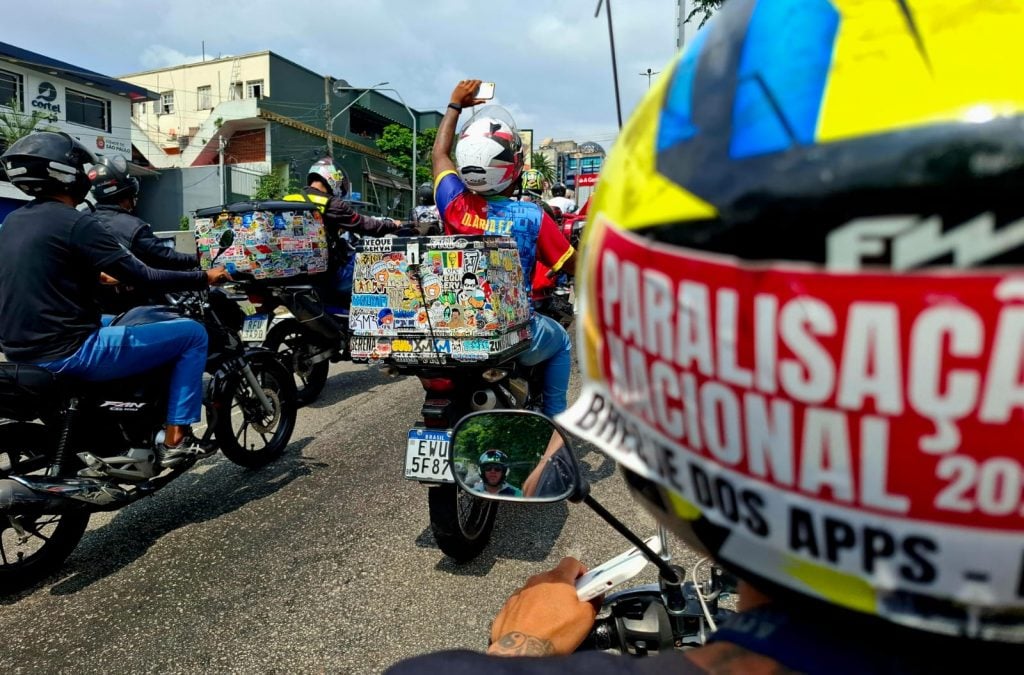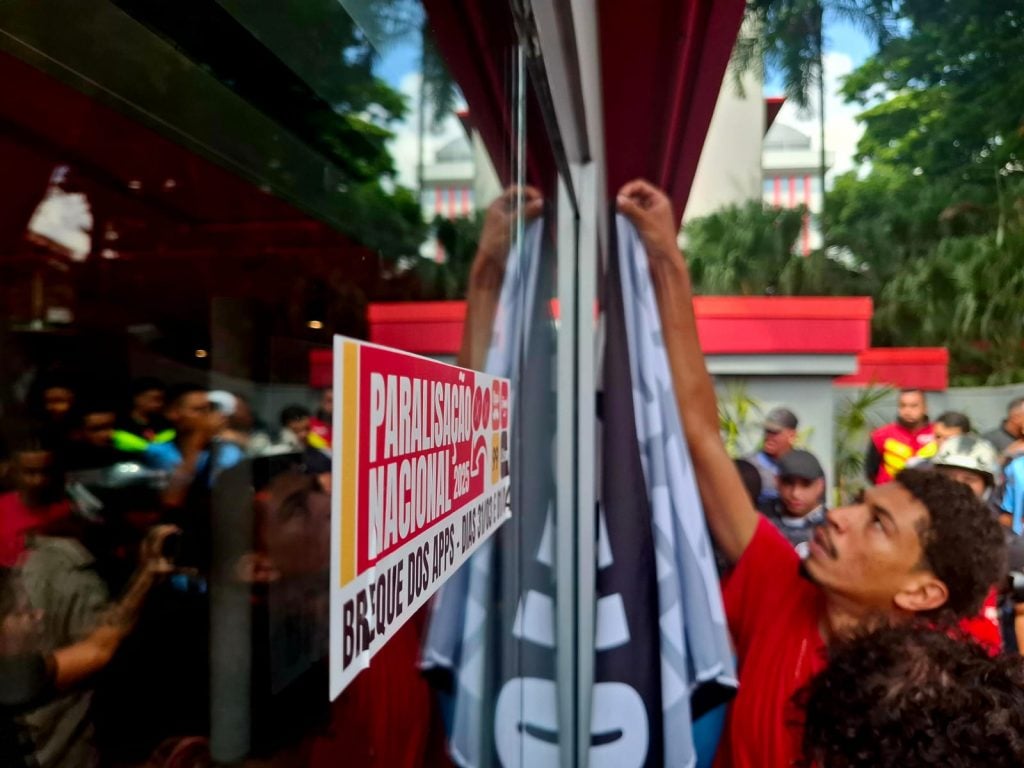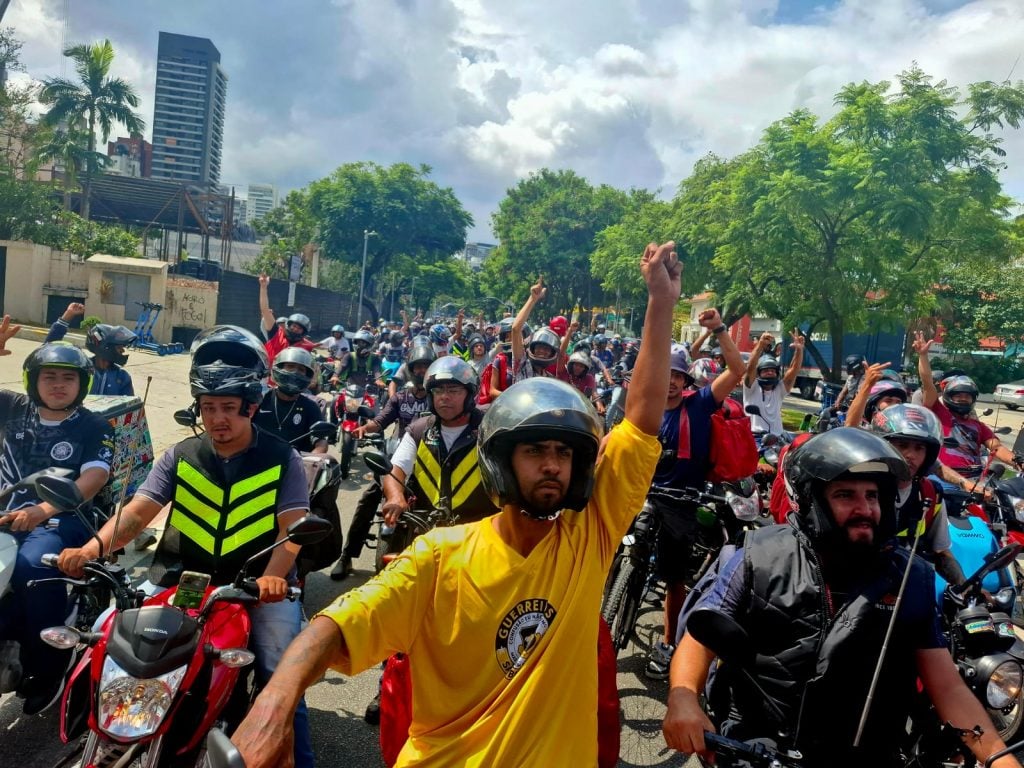In the largest mobilization of app delivery workers in the city of São Paulo since the so-called #BrequeDosApps, in 2020, around 2,000 workers held a motorcade on Paulista Avenue towards the headquarters of the app iFood, in the nearby city of Osasco, on Monday (31). The protest is part of the 48-hour National Strike, organized simultaneously in around 60 Brazilian cities. It demands, among other things, an increase in the minimum rate per ride from BRL 6.50 (US$ 1.14) to BRL 10 (US$ 1.75).
After waiting for hours in the rain in Osasco, the company said “no” to the workers’ demands. Then, they left the location divided into groups formed by app delivery drivers from each area of the capital and metropolitan region to stop food deliveries from the city’s main shopping malls.
The delivery workers promised to prevent orders from dinner time on Monday until Tuesday night (1), the day also set for a national mobilization.
“The strike will continue. iFood didn’t give a shit [sic], but they saw that the movement was strong all over the country. And we’re going to continue because we’re going to send the message. It’s not fair what they’re doing. They fooled us, they gave us no answers, so we’re going to stop the whole country,” announced one of the strike leaders from the top of a sound truck, to loud applause.
In addition to the minimum rate, the workers demand an increase in pay from BRL 1.50 (US$ 0.43) to BRL 2.50 (US$ 0.26) for each kilometer traveled; a limit of 3 kilometers radius for deliveries made by bicycle; and full payment per ride even when orders are grouped on the same route.

The demands were presented by a committee of nine delivery workers who, after pressure, had a close meeting inside the company’s headquarters with João Sabino, iFood’s Public Policy director, and Johnny Borges, the company’s Social Impact director. The latter is a well-known name to delivery workers involved in mobilizations in recent years: He is responsible for dealing with workers’ movements.
The committee’s arrival at the iFood building, however, was troubled. The delivery workers themselves had heated discussions. Some felt that the dialog had to take place with an iFood representative outside the building, explaining things to everyone. The company refused to do so. Another group thought it was valid for some leaders to enter, as long as the meeting was broadcast live.
The strikers nominated ten people. iFood allowed nine to enter the building. The entire negotiation was mediated by the Military Police (PM, in Portuguese). Once allowed, the committee members entered the company’s headquarters one by one, escorted individually by PM Major Mosna.
Inside, the workers’ representatives were prevented from recording the conversation. Once again, the demonstrators disagreed. Many argued that, without a live broadcast of the meeting, the committee should leave. Those who opted to hold the meeting won. However, their demands were not met with a positive response.

“Without us, there’s no iFood, there’s no app. So, we will go all the way. We’re going to stop all deliveries and we’re going to stay engaged in this fight. We’re not going to give up,” said Jr. Freitas, one of the founders of Brazil’s Alliance of App Delivery Workers (ANEA, in Portuguese) and who was part of the negotiating committee.
“Let’s go, it’s a strike”
To the sound of horns, motorcycle exhausts and “Let’s go, guys, it’s a strike”, thousands of delivery workers met on Monday morning (31) in front of the Pacaembu stadium. The banners read “Billions for iFood, crumbs for delivery workers” and “iFood, Rappi, 99 and Uber: parasites promoting modern slavery.” “This is people’s revolt. This is workers’ revolt,” Freitas said from the top of a sound truck.
André S., 19, delivers food to addresses in the Faria Lima area, one of Brazil’s main financial market centers. “iFood puts our lives at risk every day in exchange for a minimum fee of BRL 6.50 (US$ 1.14). That’s unacceptable,” he said. “We’re here today against overexploitation and precarious work,” explained the worker.
After occupying an entire stretch of Paulista Avenue, while people on the sidewalks gestured in approval, the delivery workers parked in front of Masp (Art Museum of São Paulo). An intervention with red ink, a bag and aluminum foil on the ground, as if covering a body, drew attention to the high rate of deaths among app delivery workers.
In São Paulo alone, motorcyclist deaths rose by around 20% last year, according to a survey carried out by the State Traffic Department (Detran, in Portuguese). There were 483 deaths in 2024, compared to 403 in 2023.
For strikers, the lethality of their profession is a consequence of precarious work conditions. “If we had decent pay, we wouldn’t have to run or work exhausted for more than 12 hours a day,” argues Diego Silva, a 20-year-old delivery man who lost a colleague last year.
The protest, whose participants were mostly male, was recorded on hundreds of smartphones. Speeches from the top of the sound truck alternated between leaders and influencers. The two parliamentarians who attended the demonstration, from opposing political spectrums – councilor Luana Alves (Socialism and Freedom Party) and federal deputy and Bolsonaro supporter Police Chief Palumbo (Brazilian Democratic Movement) – were not allowed to speak from the sound truck.
The demonstrators’ lunch was partly guaranteed by the donation of 300 lunch boxes from the solidarity kitchen of the Homeless Workers’ Movement (MTST, in Portuguese).
A delivery worker for seven years, Alexandre dos Santos argues that the platforms are paying “the minimum of the minimum”: “We go to the market and we can’t keep up with the price of food, we can’t keep up with the price of fuel.”
“We’re fighting [for our rights]. I don’t see anyone fighting for us. Also, when we go to work, we’re disrespected a lot. People treat us like we’re nothing. That’s why I’m here and I’m going to stay here until things improve. Because we deserve it. We work in the rain, we work in the sun. And the least they have to do is recognize it,” Alexandre defended.

BdF contacted the Brazilian Association of Mobility and Technology (Abomitec, in Portuguese), which represents companies such as iFood, Uber, Lalamove and 99. The organization said it “respects the right to demonstrate” and that the average income of delivery workers “grew 5% above inflation [in Brazil] between 2023 and 2024.”
iFood was also questioned about the reason for denying the workers’ demands, why the police mediated the delivery workers’ entry into the company building and why the meeting could not be recorded. In a statement, the delivery giant confirmed the meeting “with nine representatives of the protesters on Monday afternoon (31), at the company’s office in Osasco. Reaffirming its openness to dialog, the main demands presented by the movement were discussed and it was agreed that iFood would contact the leaders with feedback.”




